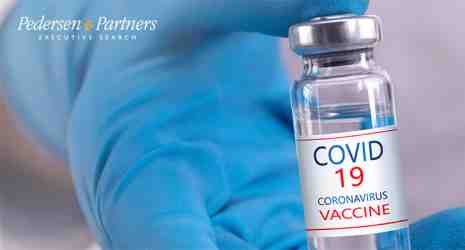Progressing insights into the influence of COVID-19 on the current and post-pandemic Life Sciences & Healthcare market
China is out of lockdown and operating business as usual, except for mandatory masks and temperature checks. APAC, India, the Middle East, most of Europe and the Americas are in various phases of reopening. Following a time of crisis and confinement, we are seeing signs of a full restart – incorporating re-setting, re-thinking, re-positioning and re-launching.
Since presenting our insights in early May, the international Life Sciences consultants of Pedersen & Partners are seeing the following developments:
Developments in Life Sciences & Healthcare
Biopharmaceutical companies have jumped on the need for drugs to fight COVID-19, specifically vaccines to prevent infection and therapies to treat the severe effects of the disease. According to the World Health Organization, around 120 treatments and vaccines are in development worldwide.
In the global vaccine race, China has four companies with products at the clinical stage, while the USA has two and Germany has one. Gilead is currently leading the search for an effective antiviral with Remdesivir, and a Bangladeshi generics manufacturer is launching a biosimilar version.
We have already seen an incredible increase in demand for diagnostic testing products, resulting in supply issues. Testing for COVID-19 virus and/or antibodies will be pivotal for a return to post-lockdown life.
In Medical & Healthcare, we are seeing elective surgeries starting up again in many countries. After the postponement of all non-COVID medical activities, we predict that it could take up to a year for hospitals to catch up with the backlog and return to general levels. The initial figures confirm that the ensuing delay in the diagnosis of other diseases (including oncology and cardiology) will have an impact on the treatment of patients and even their life expectations.
Access to hospitals is likely to become more difficult, and this will create opportunity for telemedicine. Virtual care providers such as online doctors and pharmacies are increasingly accepted by the general public and authorities.
Hospitals and their suppliers reconsider end-to-end supply chains
Across the industry, there are calls to review and rethink the global end-to-end supply chain. Prior to the pandemic, Sanofi announced its intention to bring Active Pharmaceutical Ingredient production back to Europe. Hard lessons have been learned, and governmental institutions are raising the importance of having key products produced closer to home and thus more readily available.
Production capacities are being concentrated on the products that are immediately needed; Bode Chemie has doubled its production of hygiene products, while Medtronic and Philips have more than doubled the production of ventilators. New business opportunities are arising; in the face of plummeting demand for their conventional products, major luxury brands have converted perfume production facilities to manufacture hand sanitizer, and are now launching designer face masks. Many biopharmaceutical companies are reviewing their production capacities while stockpiling contract development and manufacturing capacity with third parties e.g. Lonza, Catalent and Thermo Fisher Scientific.
A new way of working
China has returned to work already, with temperature testing and facemasks. Europe is now gradually opening up, with the first few office workers returning. Some are hesitant, while others are happy to see their colleagues in the flesh again.
It is generally expected that remote working will become a standard part of the daily routine. The lockdown has presented a unique opportunity to learn and develop new skills, connectivity strategies and increased creativity, and it has had a positive effect on the speed of implementation of several digital tools/platforms. Moreover, lockdown has demonstrated that the management of teams working remotely demands an extra dimension of leadership, with increased coaching and motivation.
Many offices are being redesigned to allow for the new 1.5m distance economy, with some companies considering reducing their office space in the future, as fewer workers are physically present.
One concern in developing economies is an expected labour shortage in the short to medium terms, which could have an impact on the end-to-end supply chain. This is likely to affect countries such as Brazil, where factory workers have expressed fear of returning to work, and India, which relies greatly on migratory and temporary labour for production.
Developments in senior recruitment: now and in the coming months
Our Human Resources contacts are starting to see preparations to pick up on postponed hiring and return to the business of recruitment. In most countries, personal meetings are becoming possible again under strict hygiene rules, but virtual conferencing will continue to play a strong role in the hiring process, as it saves both money and time. However, many managers have told us that they still see a final face-to-face interview as critical, so we expect to eventually see a balanced mix of virtual and face-to-face interviews.
Many Human Resources professionals see the unprecedented circumstances as an opportunity to modernise the recruitment process (e.g. with digitalisation, video interviews, online assessments and AI). In general, there is more caution about bringing new hires on board, but this is only expected to be temporary. When recruitment picks up again, the demand for strong leadership talent is expected to be even higher than before the pandemic.
Before the pandemic, we were already seeing an increasing demand for contemporary leadership as one of the trends in Life Sciences & Healthcare. Additional investment in Biopharmaceutical R&D and Manufacturing will lead to an even greater need for technical and scientific leadership, and simultaneously, more digitally-savvy commercial leadership will be required.
The take-home message is that key hires cannot be postponed for too long; there is an increasing demand for skilful leaders who can power through the crises and effect change with visionary ideas and strategic thinking.
A good portion of professionals continue to be highly risk-averse. They need to be inspired, reassured and convinced to even consider exploring a job change. For senior jobseekers, it is currently quite hard to find new opportunities, because companies have slowed down the recruitment process and fewer roles are available. However, this is set to change in the coming months, and the wave of postponed hirings will once again create a candidate’s market.
Communication is more critical than ever in times of crisis, and Executive Search Consultants can fill the skills gap with their network and knowledge of the market. With new leadership traits in demand, expert consultants will be able to make a more effective match.
The added value of Executive Search
In countries that are lifting the lockdown over the next few weeks, companies are also emerging from their bubble, and will need to decide on their next steps and strategies. Executive Search Consultants can help with strategizing about the new leadership roles and skills that will be required in the new normal.
Executive Search firms with experienced consultants add value in various ways, and specifically now:
- A contracted mandate adds credibility to the impression that the company is genuinely committed to making a senior hire.
- In order to prepare for hiring freezes to be lifted, Executive Search firms can proactively start tracking leadership talent for clients via tailored Market Mapping programs.
- Executive Search firms are well-placed to carry out Confidential searches for senior hires.
- An active search approach that actively promotes the company and its job opportunities can attract attention in a credible way.
- Companies can benefit from the wide circle of trusted contacts that experienced consultants bring.
- Last but not least, Executive Search firms can actively steer the hiring process, adapting it to dynamic environmental changes with a preferred finalist candidate to a mutually-beneficial closure.






